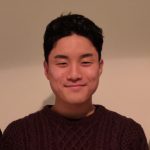Shohei Nishimura
Home University: Tohoku University
Field of Study: Materials Science and Materials Processing
Status: B2 Expected Graduation: March 2020
Research Host Lab: Prof. P.M. Ajayan and Dr. Robert Vajtai, Department of Materials Science & NanoEngineering
Research Project Title: “Hybrid Flexible Films with Tuned Properties for Multifunctional Applications” (PDF)
Why Nakatani RIES?
This internship opportunity will allow me to gain practical experience, as well as prepare for my future career. Science and engineering research has many exclusive studies and many universities and research laboratories in the U.S. have their own fields that they specialize in. Some of the laboratories in the U.S. also have better facilities and equipment. Therefore, I am eager to go to a Graduate School in U.S. and I want to learn how research is conducted in the U.S. One of the reasons I applied for this internship is that I can experience conducting a research at a cutting-edge laboratory in U.S. even though I am still a sophomore and have not decided what I will specialize in yet.
Through this program, I will gain an understanding of how challenging research can be, as well as what skills and knowledge are necessary in order to conduct research properly. Thanks to this experience, I will be able to focus on acquiring those skills and knowledge during my college years at Tohoku University and prepare for enrolling and researching in a U.S. graduate school.
Moreover, I am also curious to learn about Hispanic, Mexican and Asian immigrants in Houston, and socioeconomic impact and challenges they face.
Goals for the Summer
- Gain cutting-edge knowledge and skills in order to properly conduct research as well as attend Part 2 program.
- Acquire English skills, especially in writing and speaking, necessary for research work in materials science field.
- Learn the differences between laboratories in Rice University and those in Tohoku University.
- Enjoy this program and satisfy my intellectual curiosities.
Excerpts from Shohei’s Weekly Reports
- Week 01: Arrival in the U.S.
- Week 02: First Week in My Research Lab at Rice
- Week 03: Interview with a U.S. Researcher
- Week 04: Reflections on English Language & Life in the U.S.
- Week 05: Research in the U.S. vs. Research in Japan
- Week 06: Final Week at Rice & Research Poster Presentation
- Week 07: Visit to Lehigh University & Closing Ceremony
- Final Report & Tips for Future Participants
Week 01: Arrival in the U.S.
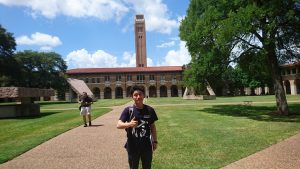
The opening ceremony in Tokyo had a really good atmosphere. Everyone was excited for our upcoming six weeks in America. I was a little bit nervous because I began to feel the pressure of making an achievement as a Nakatani Ries Japanese fellow. We had some free time during this three-day orientation and I got to eat out and talk with some of the other JP fellows. This was the first time of us had free time to talk with each other. We talked about our majors, expected research topics at Rice Univerity and our future goals. I guess it was a necessary opportunity to get along with them from the very beginning of our six weeks in the U.S. During this time, I was also struggling to read and understand the papers Dr. Ashok, my mentor, had sent me. This was due to my lack of knowledge about material science and English specific terms.
During the pre-departure orientation in Tokyo, Professor Yoshichika Iida’s lecture was most helpful to me as I prepared for my departure for the U.S. It was about the “Transfer Skills Development for Ph.D. Careers”. Transfer Skills refers to many skills, but the most important skill is to clarify what is a problem to solve in research. Thanks to his lecture, we could clarify what we should learn and what we would like to learn during this research internship. Moreover, we evaluated our lives using a figure which is plotted with happiness as the vertical axis and time as the horizontal axis. I plotted that this time is the happiest time in my life. I realized that a big reason for this was because I would be conducting research in America. I rolled up my sleeves and am now ready to begin my research at Rice University!
During my first days in the U.S., I had breakfast with the other Japanese Fellows in the Wyndham hotel’s restaurant and the clerk was very friendly to us. She greeted us with a big smile and called me “babe” and asked us if we will come next morning again!! This situation was exactly what I expected. Cheerful greeting and small talk. Although, I did not expect that those all words were in Spanish accent. Even though I learned that America is a diverse country with many cultures in school and I have been to America twice, I was surprised the number of people who are not “American” in America. Perhaps, the location of Houston is one of the reasons, and just because I could not find that a person is not a native English speaker by his or her accent before. Anyway, I didn’t expect that there are such many foreigners in America.
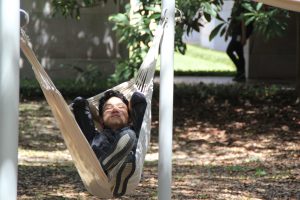
My initial reaction to Houston was “Houston is not hot as I expected.” When I asked exchange students about Houston at Tohoku University, all of them said that Houston is deadly hot and humid. Thus, I thought the climate would be too uncomfortable to handle in Houston. The temperature is actually high but it is not so humid to me. I thought that the climate of the pre-departure in Kyoto was much worse. Literarily, it was deadly humid, hot, and unpleasant in Kyoto. I guess the main reason for this reaction was that I had asked exchange student from countries with dry-summer. This misunderstanding could be occurred by cultural differences of how we experience heat and cold.
During the Orientation Program at Rice University, the talks given by Prof. Kono were most helpful and I learned a lot. Especially, I found two topics very interesting, the Ph.D course in America and what we should acquire in this program. The fact that only 60% students can get Ph.D. in Ph.D courses was surprising. Even entering American University’s Ph.D. course is big deal to me, I am not sure if I can pass some exams to continue it. I became a bit frightened but I believe firmly this research experience will encourage me by helping me understand better the American research situation. He also said that no one is expecting we can get wonderful results in such a short time. Therefore, we should concentrate on understanding the purpose and methods of our research project. This understanding will help me not to be too sensitive when I cannot get good results in research.
My first weekend in Houston was a really typical American weekend. I enjoyed a Houston Astros baseball game in Minute Made Park with some of the other Japanese fellows. It is very big and the cheering sections have 4 floors. It was a home game and the Astros won! It was a great exciting night.
Question of the Week
If I had another life, I would like to be an American. How about American? What is the majority answer? Why? I spent much time and money to learn English and need much more effort to be Dr. Shohei in America. However, if I am an American, I do not have to learn English and would be able to spend whole my campus life in America. What more could American ask for?
Preparing to Do Research in the U.S.
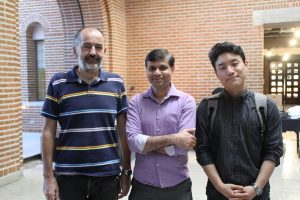
Prior to departure for the U.S., I tried to maintain the level of my English for my upcoming experience at Rice University. I think your English skills are better than minimum standard if you can pass the essays and interviews for participating this program. Thus, in my opinion, you should memorize some words in English which are often used in your field to improve your English skills before you leave Japan.
I communicated in advance with my host professor. Thanks to Sarah, a person who is in charge of this program at Rice University, I could communicate with Prof. Ajayan smoothly and he decided my mentor very quickly. Then, I asked my mentor to send me 4 papers about my research topic. The papers he sent were about quantum dots, metal organic frameworks, porous carbon nanofiber composites, and 3D structure using carbon nanotubes. It was my first experience to read papers about materials science. Just reading the abstract took around 1 hour or more because there were many new English terms and I had to search for their definition one by one. Even though I translated the terms, I had no idea what some of the words meant. It was actually hard but reading the papers and coming into contact with cutting edge technology was satisfying to my curiosity about the field. My research topic in Ajayan lab is about quantum dots after all. However, reading papers about other topics was not useless. I learned many ways to evaluate materials and was able to grasp a rough idea of how research is conducted through reading these four papers
How to prepare for research in America would depend on the person. I will just introduce my experience as a student who is majoring in material science. The beginning of the experience was a synthesis of quantum dots for evaluation. My mentor was great so I could prepare it only by following his processes even though I don’t yet understand what the process is for. However, I needed to study and understand the process after the experiment and searched for more information myself in the evening to better understand. Then, I realized that the most important subject in college was Introduction to Materials Science. Of course, to master thermodynamics or electrodynamics is important, but I think they are not crucial to this program. According to Prof. Kono, we are expected to understand the background or methods of research, so I think understanding definitions of specific terms is essential especially in material science. Thus, such a lecture will help you to understand research and papers easily to some extent.
Week 02: First Week in My Research Lab at Rice

On the first day, I met Ashok in Dr. Vajtai’s office and we talked about mainly my research topics. We also talked about what I learned during the last semester. The first day’s introduction was very brief. After that, we had a reception and free dinner. Fortunately, both of them could come to dinner so we were able to get to know each other more.
My mentor is Dr. Ashok Kumar Meiyazhagan who is a postdoctoral researcher and from India. He is a hard worker and he had prepared a perfect plan for my four-week experiment. I think it is because this is the second time for him to be a mentor of a Nakatani-RIES JP fellow. In 2016, Ashok also mentored Mr. Toshihiro Takada on his experiment and poster presentation. Thus, I am free of worry to some extent. Of course, I need to do my best so that I can get as good of results as Takada-san did. Moreover, Dr. Ashok is very kind. He sometimes says he is very busy because he has his own research project, but he usually takes care of me and helps me a lot. I am sophomore so, unlike the other junior NK RIES JP Fellows, I have not had very many experimental classes. However, Ashok taught me how to use tools and machines gently, and my research is going well now, actually. I feel that I was really lucky.
My research should be completed in 4 weeks by myself, so I do not have any other members of the lab that I work with on my experiment and I usually only talk about my experiment with Dr. Ashok. However, there is also a Japanese woman in the Ajayan research group. She is Keiko Kato who is researching about batteries, so she is usually working in another laboratory. She sometimes attends our events and tell us about US laboratories and leads us some places in Houston as the assistant for the Nakatani RIES program.
From next week, I am going to ask other members in both my and other laboratories to evaluate my materials and write a paper. Moreover, I will speak with another member about his research topic, a 3-D carbon material. I hope this will help me communicate more often with other lab members.
First of all, I had really hard time speaking in English. This was due to lack of my knowledge of scientific terms. My mentor explained methods but there were many words I did not know. He pointed out what they are but I could not memorize them immediately. For example, I said “the spin machine” when referring to “a centrifuge”. There are many machines and processes which I do not know, even in Japanese, but I am learning them bit by bit. I think I am communicating with my mentor much more smoothly than before.
In addition, my mentor is Indian and his Indian accent was completely new to me because I do not have any Indian friends at my university in Japan. He speaks English very well, but was not used to an Indian accent, so I asked him many times to repeat what he just said. I have gotten used to other accents in the past so I think it will be okay. Actually, I became to be able to understand his English in just 3 days, and when I say “Pardon?” it is always my fault now.
Outside of research I also attend some seminars this week. The session on how to develop and present a research poster was very useful to prepare for my final poster. I learned that knowing how many pictures and how much text we need and how to develop a simple title so that even people who are not familiar with this topic can understand are also crucial to developing a good poster. I should also review some of the some good posters from past American fellows to get ideas for my poster.
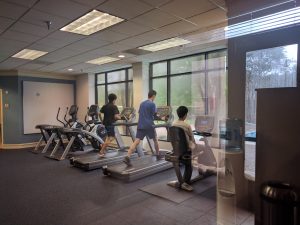
The laboratory training class was useful and my mentor also told me some safety rules before we started the experiment. However, I mistakenly broke the rule and went out my laboratory wearing both gloves. A professor found it and advised me. It was totally the first time to break the rule so I was lucky. Thanks to him, I will not do the same again . Safety first. I would like to finish this program safety.
We saw solar eclipse on August 21. Thanks to special glasses that were donated by NASA to the Rice Space Institute, we could see it well. It was like a crescent moon and I felt little be cooler because of less sunlight. It was cool.
Hurricane Harvey is coming! The campus was closed after 3 pm on Friday and I went back to the hotel before lunch time. For safety reasons, the Nakatani organizers decided to postpone NASA tour on Saturday. We are going to stay inside this weekend.
Research Project Update
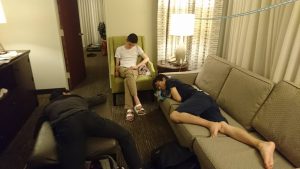
My research topic is about quantum dots. They are a semiconductor and they are very small. I am trying to produce a quantum dot only from biomass, when it is usually made from heavy metals. My project goal is to prepare and evaluate films and gel which contain quantum dots. The exact details are secret until we publish this research. I hope you check my poster and understand my research topic deeper.
I mixed quantum dots and biomass, bottled it and the processed it to make film and gel. I used an autoclave, sonication and centrifugation, and some measurement tools. I will ask other members to use more equipment such as for dynamic mechanical analysis.
I am going to finish preparing my materials in two or three weeks and wait for results of the mechanical response, thermal stability, luminescence, cytotoxicity, and electronic conductive. While waiting for them, I will write a paper and enrich my understanding.
Some equipment is often used or reserved and I sometimes cannot use them. I had to wait a long time because of this situation. I had hoped to join a laboratory in which members are very motivated to research, but the down side is that time-management for using equipment can be more challenging. What should I do to cope with such a situation?
- Yes, in a large research group like the Ajayan Lab it can sometimes be difficult to schedule time on the various equipment you need as it may be used simultaneously by multiple students doing multiple research projects. Universities also have ‘shared equipment’ that are used by multiple research labs and then you have to carefully schedule use of that equipment as well to be sure you have the time you need to run your experiment.
- The best thing to do is speak with your mentor and ask him what equipment you need to schedule and when he thinks you may need to use it. Then, you can add your name to the schedule/request list for those future dates and if you end up needing to alter or change your time you can do that later. The important thing is to get your name on the list/schedule as, if you wait until the last minute, all of the time slots may be full.
- Time management in research is an important skill and it does take time to learn how best to schedule/plan your experiment and for the equipment you need to use. This also means that you may need to be flexible and sometimes come in very early, stay late, or come in on the weekends to use a very popular piece of equipment if the daytime slots are full. This is why graduate student’s research hours can vary sometimes as they may be there from 12:00 – 8:00 PM as that is when the equipment they need to use is available.
Question of the Week
The new semester has begun. Some students are using skateboards to go their next class and a few students use electric skateboards like Casey Neistat. You cannot ride a skateboard on busy road and places where there are many people in Japan. Are there any laws about skateboards to limit uses?
- At Rice University, there are specific rules about bike safety and these rules also apply to skateboards too. Most campuses will have similar rules. However, they are not always strictly enforced and often students just use the fastest way possible to get across campus to their next class. For example, if you have a class in Brockman Hall that ends at 10:50 AM but your next class starts in the BRC at 11:00 AM you only have 10 minutes to make it all the way across campus. This is why you see students biking or riding skateboards to quickly get across campus; otherwise they would be late for class each day. If the sidewalks are too crowded students will pick up their skateboard and carry them but in the U.S. you will see lots of college students biking and riding skateboards around campuses; it is very common.
Week 03: Interview with a U.S. Researcher
I interviewed Dr. Ashok who is my mentor.
He has a Ph.D. and when he was an undergraduate student, he had an opportunity to do an internship like me. He conducted research in the chemical field. His mentor taught him a lot about chemistry and he realized that many stuff in the world is about chemistry. Therefore, he decided to study chemistry. His home country is India. He said that compared with his home country, there are more researchers in a laboratory who are from other fields in the U.S. He can deal with his research topic from many perspectives thanks to others who are there in the lab. In that way, US laboratories are better for him. His career plan is to go back to India and having his own laboratory. He is eager to do research about nanotechnology, and nanomaterials especially organic batteries. He mentioned that Rice University’s laboratories have more female and exchange students compared with Indian universities. In addition, the other lab members are very friendly.
He got Ph.D. in U.S. and he is a postdoctoral researcher in the U.S. Internationalization of research impacted his work. He met many people from different regions, so he could have many perspectives. That is important for learning things. Being just a chemist is not perfect. We need perspectives from different areas. He asked me why I would like to research in U.S. because there are many good laboratories also in Japan. My answer was that I hope to get a Ph.D. in U.S. The fact that I have Ph.D. itself would not be a goal. My goal is to work in other countries as an engineer or researcher. In Japan, getting a Ph.D. is not so common and I hope that getting a Ph.D. in a good University will help me when I am trying to get a job in other countries. Moreover, I need to do research for a Ph.D. I believe, U.Ss laboratories have more research grants than Japanese laboratories. This means that I can conduct research more freely. Thus, I would like to get a Ph.D. in the future in a U.S lab environment.
Reflections on the Interview: I was surprised that he said he is going to go back India later because one of the reasons I would like to enroll U.S graduate school is that I want to leave Japan. His wife and child can be part of the reason, or, possible, he does not want to work in the to U.S. I realized that even a person who comes to U.S. cannot dismiss his or her background.
I think there are many people who try to get Ph.D. in U.S. and become a postdoctoral researcher or faculty members. What is the percentage of people who work in academic situation that will go back their home countries again, like Dr. Ashok wants?
- There is no complete data on an exact percentage of international students, post-docs, and researchers who return to their home countries. This has varied over time and partly it is because more and more countries are doing cutting-edge research and have more funding and opportunities available for researchers to return. Indeed, countries like China are actively recruiting back Chinese students and faculty members by giving them very attractive job offers at Chinese universities and research facilities.
- This is often a very personal choice for researchers and faculty and is due to a combination of what is best for their career and what is best for them personally and/or what is best for their family. There are often very few tenure-track faculty positions available in a field each year so to have the best chance of securing a good job it is helpful to be geographically mobile and open to the possibility of moving, even to a different country, for a position.
- For more on this see the section on Why International Research? on our Doing Research page.
Question of the Week
Many students were buying Rice University rings in student union today. What are they for? I even cannot understand wearing university T-shirts or hoodies personally. Do they wear them for show off their university?
- Yes, these are called class rings and students often buy them before graduation from high school and college. By wearing your class ring, it makes it easy for other alumni to realize you graduated from that university and it is a way to show pride in your school/university. Not everyone buys them because they are expensive and some people don’t like wearing them. But they are a tradition in U.S. high schools and colleges. The people you see ordering these at the bookstore are students who will be graduating in May.
- A Look at the History and Tradition of the Class Ring
- History of the Rice Ring
Research Project Update

During the past week, we could not conduct research because campus was closed due to Tropical Storm Harvey.
I prepared films last Friday, but I cannot check if they are perfect until next Tuesday because Monday is also a holiday (Labor Day). Thanks to Nakatani Foundation, we can stay at Rice longer to finish our research. Therefore, I still have two weeks. I failed to prepare them once so I am worried about my films. I can only pray now. If they are perfect, I can start to evaluate their properties immediately. I do not know what kinds of machines are needed yet. I have just asked other lab members to evaluate them using many machines, but I need to learn about basic mechanisms for understanding data.
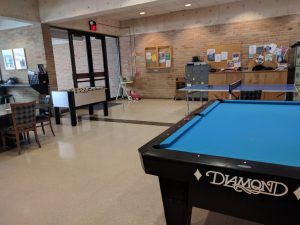
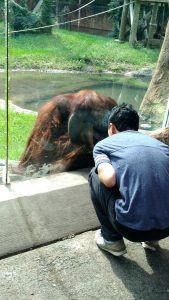
Week 04: Reflections on English Language & Life in the U.S.
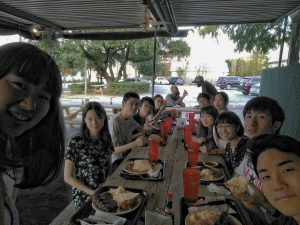
English communication in my research laboratory is mainly talking about what we are going to do with my mentor. My mentor and I are not native English speakers but I think we are getting used to each other’s English accents. However, I also had an opportunity to communicate with an African researcher. I visited his office to ask him to evaluate materials for me, and I could not understand what he is saying very well. I asked him to repeat what he said every time. I think he is not a native English speaker. It was hard mainly because I have not yet gotten used to African accent yet; similar to when I met my mentor for the first time. There are not so many African exchange students in my university, so I hope I will understand his accent before I come back Japan.
Moreover, I had also a hard time. It was not communication but I would like to share this experience. I attended the Ajayan laboratory’s group meeting on Friday. It is a large group and there are about 30 members, so we had it in another building. Three members gave presentations about their research and two of the presenters seemed to be from the Middle East and the last to present was Keiko who is Japanese. When the two men gave their presentations, I could not understand them. Of course, the fact that their research topics are were not familiar to me is part of the reason, but I felt the lack of my listening skills keenly. I understood Keiko’s presentation to some extent, even though her topic was also out of my range. It might be because the Japanese accent is easier to understand for me

In my daily life living in Houston, I rarely talk with others. However, when I go to my laboratory, I say “Thank you” to the driver every time mainly because other passengers say this. Japanese buses have two doors and we get out through a rear door, so I do not say anything to the drivers. I prefer the American style. I think drivers are motivated by our appreciation. It is necessary for better service.
One challenging experience I had communicating in English was when I needed to ask one of the other researchers, Peter, to evaluate my materials. Thus, I and my mentor make an appointment to meet Peter. When I met with him, my mentor also should have been there but he was not able to come. Then, Peter seemed a little bit uncomfortable, so I needed to explain and apologize to calm him in English. It was very challenging for me because the situation would have been awkward, even in Japanese. Finally, Ashok came and it worked out. However, I’m not sure how I would handle an experience like this again in the future. I do not have much experience to apologize and I do not want to, so I cannot practice the situation from choice like shopping situations or something. Accordingly, I should prepare beforehand personally. If I knew how to deal with the situation, I could deal with the situation well.
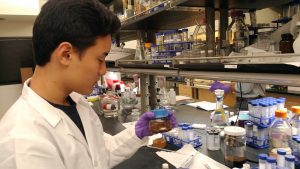
I concluded that just talking in English and finding what phrases I cannot say in English is the best way to improve English speaking skills. Even in Japanese, a person uses certain phrases and talks sort of about the same stories again and again in his or her life. Having conversations is the best way to find how to use these new phrases, and using the same phrases makes it easier to use them. Thus, if you cannot have these opportunities, talking to your imaginary friend is still fine. You can use many phrases and talk about the same topics as much as you want. Even if you talk while searching phrases on the Internet, no one complains.
Listening skills are also crucial skills in communication. I think we can improve speaking skill by also reading. For example, memorizing some words or phrases should help to improve your talking by increasing your options while talking. However, listening skills are improved by only listening to English. When I cannot catch words correctly, I even cannot ask to repeat. Therefore, I am thinking just listening to English is the only way. If someone knows effective special techniques to improve listening skills, please let me know.
Research Project Update
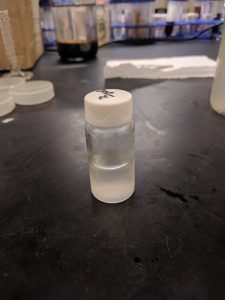
I checked my films for the first time in ten days. They completely dried up, but they are too thin and my mentor could not remove them from dishes perfectly. Moreover, the gels are too soft, more like liquid, so we cannot test their strength using DMA (dynamic mechanical analysis) in the Ajayan laboratory.
I prepared two films in different concentrations again in this week. We will test those films during while I am preparing the rest of the six films. In my experience, films take at least 50 hours to dry, so I am very worried if we can finish testing them until Thursday, which is the due of the draft of the poster. The gels are going to go better than films. My mentor asked his friend in another laboratory who can use a DMA which can test very soft material. In addition, softness is not a problem to test cytotoxicity, photosynthesis, and so on.
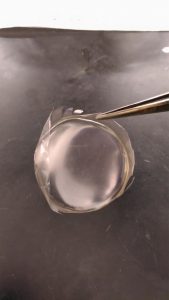
Question of the Week
There are many McDonald in U.S. and Japan, and it is a sort of poor man’s restaurant. My mentor said that McDonald’s is a very fancy expensive restaurant in India. In addition, KFC is an also low quality fried chicken restaurant in U.S. but it is great supper for the Christmas night in Japan. Are there any restaurants or products which are expensive or good stuff in Japan but are not in U.S?
- Yes, different restaurants or stores can have different reputations in various countries or throughout history. For example, Sears is a very popular department store in countries like Mexico but it is an unpopular place to shop for clothes now in the U.S. In the past, it was very popular but it’s role/reputation in the U.S. has changed over time.
- In Japan, I would say that things like sushi or ramen can be eaten as quick/fast/cheap food but in the U.S. going out to a sushi restaurant or ramen restaurant is ‘new’ and ‘cool’ in many places. There are also very high-quality and expensive sushi restaurants in Japan but in the U.S. I would say that sushi restaurants tend to be seen as being more middle-range; cool, not too cheap, not too expensive.
- However, in the U.S. most people would never buy sushi at a convenience store as convenience stores are seen as having not very fresh/good food. So, whereas in Japan you can easily buy sushi and other prepared foods in a 7-11 people in the U.S. would think that was a crazy thing to do and would likely make you sick.
- The other thing is that you may often see Kobe beef burgers or steaks on menus in the U.S. but these aren’t usually ‘real’ Kobe beef. Real Kobe beef is very expensive in Japan but you may see Kobe beef burgers or steak on menus at middle-range sit-down restaurants in the U.S. People like to order it because it is ‘special’ but compared to Kobe beef in Japan; it is usually not very high quality or authentic.
Week 05: Research in the U.S. vs. Research in Japan
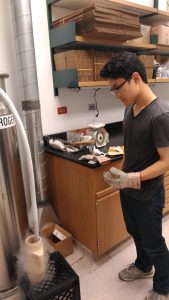
At Tohoku University, I was took a class where I visited a laboratory and conducted easy experiments once a week. The laboratory’s research topic was in the medical field so the situation was different, but I would like to compare it and the Ajayan Lab at Rice University.
The biggest differences between them are the quality of discussions in English. There were some graduate students or researchers from other countries in the Japanese laboratory, but Japanese students’ English skills were not so good and they had difficulty communicating with each other. On the other hand, members’ English abilities are amazing in the Ajayan laboratory. Of course, we need good English scores to enroll in an American graduate school and they are improving their English day-by-day in the laboratory. Therefore, American laboratories are absolutely better than Japanese ones for quality and quantity of conversation for foreigners.
As a small difference, the structures of laboratories are interesting. The laboratory where I conducted research in Japan had some rooms but they were all connected. However, the Ajayan laboratory’s rooms are separated. We need to go out to a corridor to go another room. We have to enter PIN every time. It is troublesome. The Japanese laboratory’s research topic was medical and using special cells and mice. This could be a reason of the different structure. I would like to know about other laboratories’ structure.
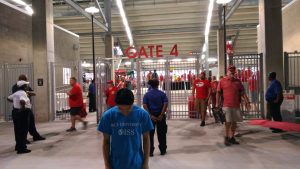
Actually, I expected that the atmosphere in laboratories in America would not be so good because some people I had spoken to said that American laboratories are more competitive than Japanese ones. However, the fact was different from my expectation. In the Ajayan Laboratory, they are helping each other for research as well as daily problems. Many researchers helped me to test materials. Especially, we asked them to test my material quickly so that I could get the results before the poster draft due, and they kindly agreed. Moreover, some researchers had difficulties because of the Tropical Storm Harvey. They were considerate of each other and shared information about insurance or service at Rice University to help students. I expected that they they would not be friendly and only thinking about his or her research. If it does not make any benefits, they do not do anything. I still think to win promotion or earn grant is more competitive in America than Japan, but the atmosphere in a laboratory is not too severe.
Japanese culture respects the person’s age or status, but I heard American culture do not respect it very much. His or her skills and abilities are more important. Actually, people do not change the way of using English unlike Japanese polite forms Keigo. So, I cannot tell which person is senior and I communicate with everyone equally in a polite manner. Though age is not big deal in America, the postdoctoral researchers have plenty knowledge and experience, and graduate and undergraduate students have less. Accordingly, when they disagree with the experiment plan, the postdoctoral researcher’s idea was accepted finally. As a laboratory or professor, age is not supposed to be important. However, the older a person is, the more knowledge he or she usually has in a laboratory. Therefore, I felt that older person tends to have initiative anyway.
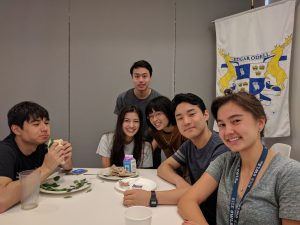
The Ajayan research lab group is very multicultural. It is a very big research group. I think there are around 30 members in it, but there are few Americans. I attended a group meeting during the 4th week, and it was the first meeting in this semester. Thus, some members were newcomers, so we introduced ourselves, and almost everyone spoke with different accents. There were many Asians, particularly from West Asia. Actually, my mentor was an Indian and I have talked with only an American once. Many people come to American universities from other countries and regions, so the proportion is sometimes inclined. Personally, I am believe that the inclination is depending on professor’s nationality or race.
Through this experience, I became eager to do research in an American university. The various lectures helped me realize benefits of taking Ph.D. in America, and a career seminar I attended at Rice ensured that my idea that getting Ph.D. is necessary to get jobs in other countries. Further, there are more students and people from other countries at Rice University and Houston than I expected. I felt that I might be able to be a researcher in America because such many people are coming and doing well. They definitely made painstaking efforts, but it means that I can be like them if I make as much effort as they did. I will keep on working hard and hope to work internationally in the future.
I will miss the Fondren library at Rice University. The atmosphere is great. The wooden desks and chairs are beautiful. The carpet and book shelves are also fancy. Especially, I love sofas by the window. Writing weekly reports or reading papers for deeper understanding of research topic at the space was very comfortable and unforgettable as well.
Question of the Week
I attended a career seminar including a panel discussion in Duncan hall. I talked with a member of Rice Engineering Asociation, which is a this event’s organizer. He told me that foreigners who get Ph.D. can get research job easier. Actually, he is researching in a company with many foreigners. However, I forgot to ask a question. How about other jobs except researching? Are many foreigners working in companies as the same as in laboratories?
- This varies by field and company. It is partially due to the requirements about getting a work visa in the U.S. Your company has to sponsor your work visa and this can be a time consuming and expensive process. So companies in fields like technology, engineering, and medicine are more likely to sponsor work visas for foreign workers than companies like non-profit organizations.
- For more on this see our Career Resources for Science & Engineering Students page.
Week 06: Final Week at Rice & Research Poster Presentation
The final week was busier than before. I started testing films. My mentor suggested many ways to test those films. All of them are needed to understand them for using as a practical application. For example, testing of strength, luminescence, and transmittance.
I started preparing my poster as well. There were many results, so I could not decide which data I will use in my poster and I got confused. However, my mentor helped me to choose them and understand what each result means.
I will do research in material sciences in the future but I am not sure that I will do research on this topic. I used some materials and they are getting attention in nanomaterial science now. Therefore, I could possibly use them again in the future. However, many topics are included in material science. I am also interested in other areas of material science research. Accordingly, I would not like to decide the research topic right now. I want to continue to do research about this topic and am now eager to learn other topics as well.
I was really worried about poster session because my mentor was sick and we could not meet the day before. So, I was not sure that if my preparation was enough. Moreover, I practiced presentation with other lab members, but some of them did not understand my presentation completely, and I changed the explanation. It was my first time to do a poster presentation, and I did not believe it would go perfectly. However, I did not have any time to feel anxious during the poster session because I was concentrating on my presentation in order to let listeners understand my research well. The posters session lasted about 90 minutes, but, personally, I felt it finished very quickly.
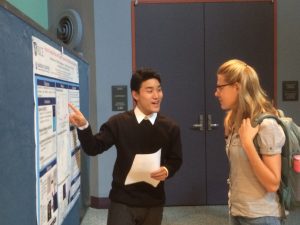
I kept on explaining during the full 90 minutes to audience members. I am happy that there were listeners continuously. We learned many tips in lectures about giving a poster session, so I tried to implement them. I particularly cared about eye contact and explained differently depending on the listener’s knowledge.
This experience was exciting. I showed that I learned a lot from my mentor and I understood the background and details of my project. Professors who will welcome us as part of the Part II program also came to this session and evaluated us. Their questions were critical and clear. I answered these questions systematically. I hope that I showed my good efforts during the last five weeks in Houston.
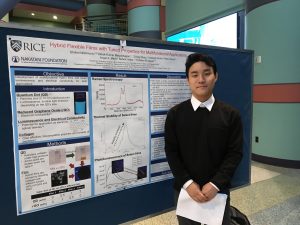
I also learned about poster design during the poster session. I designed it so that others can read it easily, but I should have designed it better as a tool to use for explanation. I pointed images and when I was explaining about my research, so I now realize that the arrangement of images on a poster are as important as written explanations. .
I hope to improve my presentation skills to explain the background and results differently depending on listeners’ knowledge. Especially, my research topic and results were much easier than other biological or chemical research, so I only had to change how I spoke about my research a little. I hope to improve them for when my research is too specific for others.
Return to Top
Week 07: Visit to Lehigh University & Closing Ceremony
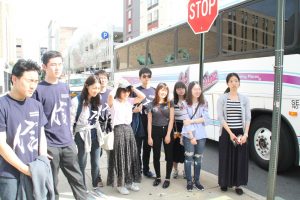
We visited Philadelphia the day after the poster session. Everyone was exhausted mainly because we prepared for the poster session until very late and the departure from the Houston was at 5:30 AM. However, the visit to Lehigh University was so good. The atmosphere was completely different from Rice University and more like British buildings.
I loved the lecture about our strengths. I had taken the test beforehand and we already have gotten the results. It was almost the last day in U.S and we all knew each other well. All kinds of our strength were explained and they exactly showed our characters and strength. At the end of it, we practiced how to talk about our strengths to others in a short time. It was shame and hard as a teacher said, but I hope to practice it well for my future.
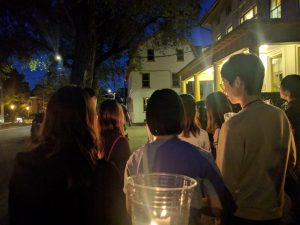
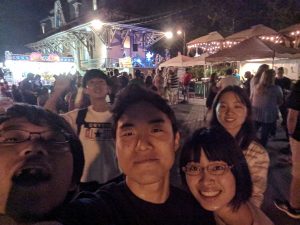
After we returned to Japan, we visited Sysmex which is a company and founder of the Nakatani Foundation. It was for the closing ceremony. Sysmex’s office in Kobe was large and beautiful. I thought a little about working at Sysmex, even though I have started to want to research in an academic situation through this program and my major is not biological. That was such a great opportunity.
We briefly presented on our research in Japanese. I heard some members’ research for the first time. All of them were good presentations, but Etsuko Ishii’s presentation was the best for me. Actually, she got the second prize in the poster session. I was motivated again.
My initial thought about being back in Japan was that I was sad. I could not believe that Nakatani RIES 2017 program had finished. I felt that my research experience was done when the poster session ended, but I had no idea how to receive the fact that I said goodbye to Japanese fellows.
Question of the Week
Our fight’s airline was ANA and clues were Japanese. Their services were beyond description. Their smile was great, and all actions were refined. Cabin attendant is one of the most respected jobs in Japan, and they are a symbol of a career woman. How about in the U.S?
- In the past, being a flight attendant in the U.S. was seen as a very prestigious or attractive job for many women. However, today, it is less glamorous and more like just a normal customer service job that can be very frustrating at times.
- There are far more career options and opportunities for women in the U.S. today so being a flight attendant isn’t seen as such a special or good job any longer. Most women in the U.S. don’t see being a flight attendant as a ‘career’ it is more like a ‘job’ as it doesn’t require a college degree and has relatively low pay. Careers in technology, finance, marketing, engineering, teaching, and other fields are far more attractive to women in the U.S. and are easier to balance work and family commitments. This is important since most parents, women and men, in the U.S. do work full-time. This is different than in Japan where most mothers do not work full-time; though this is changing slowly.
- There are also now more discount or regional carriers that don’t offer very good salaries or job benefits to their pilots or stewardesses so it is not always a very ‘good’ job; it depends on which airline company you are an employee of (see the link to the documentary below).
- However, many people do like the idea of being a flight attendant as one of the job benefits is that you get to fly for free on your company’s airlines; although this is on standby which means you only can fly if there is an empty seat on that plane’s route that day. But it is still very attractive that, if you work for an airline, you can travel for free to various places on your vacation time.
- Most Common Misperception People Have About Being a Flight Attendant
- The Golden Age of the Stewardess
- The Real Life of a Flight Attendant
- Documentary: ‘Flying Cheap’ (Watch online for free)
Final Report & Tips for Future Participants
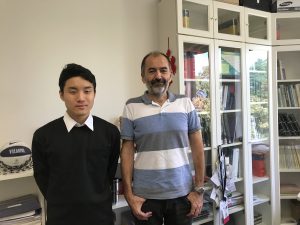
Human relationships are surely important as mother said. I met many people in this program. Many researchers helped me kindly in laboratories, other participants were also kind. The staff at Rice University and in the Nakatani Foundation were helpful as well. They allowed me to do my best in a new situation. If I had a lot of troubles with human relationships, I could not finish this program successfully.
The Nakatani RIES Fellowship program allowed me to outline research in laboratories. Sophomore students in Japan hardly have experience in laboratories, and will not know about research in laboratory until senior in my university. Due to this experience, I will be able to choose the best laboratory for me when I look for a host laboratory as a senior student. Moreover, this experience motivated me to learn specific subjects.
I also learned that unity is crucial to achieve a big goal. I expected that research is a lonely activity. However, it is not. I cooperated with many researchers and finished my research internship successfully. Each person has what he or she can do, and it is different from person to person. Cooperation does not mean just leaning on others. We need own skills and good relationships as well. We can achieve a bigger goal thank what I can achieve by myself.
I would tell students at my university in Japan that classes are much more important than we expect. We are studying special subjects, but we focus on only tests. We usually do not imagine that we will use it in research someday. We must understand the theory deeply enough to use them easily as our own knowledge. For example, I have never imagined that quantum physics is needed to understand quantum dots’ properties. We should learn the basics for our future especially before deciding particular research area.
After completing this program, I will learn English more eagerly. English scores for studying abroad are not just a standard. It is a requirement. I need great reading skills to read many papers in a short time. Listening and speaking skills are also important to communicate with others for research, and poster sessions. Writing skills are important for writing papers. Even if I have good scores, my skills are just fine. They will not be enough forever.
Tips for Future Participants
My advice for future participants is “please care about your mental health”. The way you do this depends on the person. Some members loved Japanese food, so they cooked Japanese rice in their hotel room kitchens. One member loved coffee and music, so he brought his coffee facilities and a speaker. Six weeks is a long time. Please bring something you love and keep your quality of life. Safety first. Bad mental health also leads to easy to avoid mistakes in laboratories.
Follow-on Project
I am going to share my experience in an organization which I belong to and via Facebook. I belong to an organization for supporting exchange students at Tohoku University. Members tend to study abroad and some past members are researching abroad. Therefore, the members of this organization will be very interested in Nakatani RIES. I already suggested many members to apply to the program. Moreover, I will share my experience via Facebook. Tohoku University students who are especially interested international experience are using Facebook. I will share some details using some photos about my time in the U.S..
I will also ask the Tohoku University international affairs division to held an information session to explain about Nakatani RIES. I heard that this trial was denied by Tohoku University before, so I would like to persuade them to hold an information session this year. Many students will notice how good this program is.
